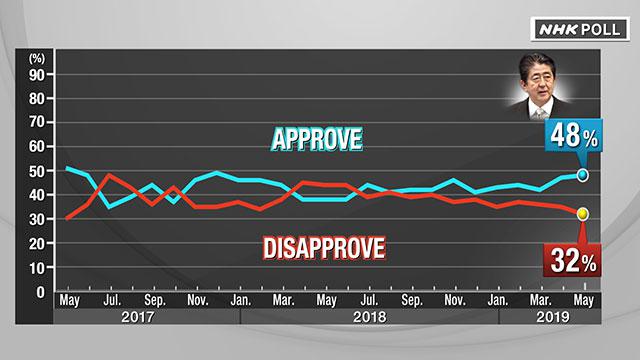Fueling the rumors
Lower House lawmakers still have two years remaining in their term, but they know that Abe has yet to fulfill some of his major policy goals and needs to strengthen his hold to do that. The policies include revising a controversial clause in the constitution, concluding a peace treaty with Russia, and resolving the issue of North Korean abductions of Japanese citizens. A Lower House win this summer may extend his term as prime minister.
Supporting this view of events is the Abe Cabinet's steady approval rating. The latest NHK poll shows it rose one point in April, to 48 percent, with the disapproval rating falling three points, to 32 percent. Some LDP lawmakers say those solid figures could prompt Abe to call an early election.

Meanwhile, opposition lawmakers worry that Abe will catch them off guard, seeing that they are ill-prepared for an election. Uncertainty about the economy is fueling this worry. A key gauge of business conditions released this week suggests that the economy is worsening. In response, Akira Nagatsuma, deputy president of the largest opposition Constitutional Democratic Party (CDP), has said that his party needs to fully prepare for elections. He said that Abe might again postpone the expected consumption tax hike and call an election.
Delaying a tax hike for an election
Why are lawmakers suspicious about the possibility of a delay in the consumption tax hike from 8 percent to 10 percent ahead of a snap election?
Abe fought two elections after making the same decision previously. They were the Lower House election of 2014 and the Upper House election of 2016. Furthermore, he called the Lower House election of 2017 after promising that 2 trillion yen, or 18.2 billion dollars' in revenue from the tax hike would go toward making preschool education free for children aged 3 to 5. Clearly, the tax hike has been a big issue in recent elections.
Government claims no change in tax hike plan
However, the Abe government says it is committed to raising the consumption tax in October. "The hike would proceed as scheduled as long as there was no repeat of what occurred in 2008 with the collapse of the US investment bank Lehman Brothers, which hit the Japanese economy hard," Chief Cabinet Secretary Yoshihide Suga said recently.

Hurdles to a tax-hike delay and double election
A simultaneous election of both houses has only been held twice before, both times in the1980s, so few lawmakers have experience of it.
The LDP's junior coalition partner, Komeito, is cautious about double elections. Komeito Secretary-General, Tetsuo Saito, has said that nobody knows what will happen in an election, and that they could lose it.
Moreover, the Diet enacted a bill on Friday to make preschool education free, starting October 1st, so if the tax hike is postponed for an election, the government will have to find the money to fund this program elsewhere.
Public sentiment about double elections
The latest NHK poll also asked people what they thought about simultaneous election of both houses. Supporters and opponents were evenly split with around 20 percent each. Half the respondents said they were neither for, nor against. Meanwhile, 40 percent said they ‘disagree’ with a consumption tax hike to 10 percent, while those in agreement or undecided were each less than 30 percent.

Summing up potential for a snap election
Some LDP lawmakers see potential for a snap election before the fall because of the upcoming political schedule. They say it would be difficult to have a Lower House election immediately after an October tax hike because there could be a temporary slump in the economy because of it. And with the Tokyo Olympics and Paralympics happening next year, it’s hard to imagine having a national election the same year. Plus, Abe’s term as party president ends in September 2021 and they say his unifying power may start to weaken then.

The opposition parties have begun preparing for simultaneous elections. Yukio Edano, president of the largest, the CDP, has met with other party leaders and they have agreed to field together just one candidate in each single-seat district, not only for the Upper House but the Lower House as well, in the event of a double election.

The Upper House election is scheduled to take place at the end of July. Only Abe knows whether the Lower House will be in election mode too.

